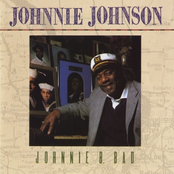Johnnie B. Bad

Biography
From Wikipedia, the free encyclopedia Johnnie Johnson (July 8, 1924 – April 13, 2005) was a piano player and blues musician whose work with Chuck Berry led to his induction into the Rock and Roll Hall of Fame. He was born in Fairmont, West Virginia and began playing piano in 1928. He joined the United States Marine Corps during World War II where he was a member of Bobby Troup's all serviceman jazz orchestra, The Barracudas. After his return, he moved to Detroit and thenChicago, Illinois, wher...
From Wikipedia, the free encyclopedia
Johnnie Johnson (July 8, 1924 – April 13, 2005) was a piano player and blues musician whose work with Chuck Berry led to his induction into the Rock and Roll Hall of Fame.
He was born in Fairmont, West Virginia and began playing piano in 1928. He joined the United States Marine Corps during World War II where he was a member of Bobby Troup's all serviceman jazz orchestra, The Barracudas. After his return, he moved to Detroit and thenChicago, Illinois, where he sat in with many notable artists, including Muddy Waters and Little Walter. He moved to St. Louis in 1952 and immediately put together a jazz and blues group, The Sir John Trio with drummer Ebby Hardy and saxophonist, Alvin Bennett. The three scored a regular gig at the Cosmopolitan Club in East St. Louis. On New Years Eve 1952, Alvin Bennett had a stroke and could not perform. Johnson, searching for a last minute replacement, called a young man named Chuck Berry, an ex-convict and the only musician Johnson knew who because of his inexperience, would likely not be playing on New Years Eve. Johnson was right. Although a limited guitarist, Berry added vocals and showmanship to the group. Since Bennett would not be able to play again because of his stroke, Johnson hired Berry as a permanent member of the Trio. They would remain the Sir John's Trio until Berry took one of their tunes, a reworking of the Bob Wills' classic, Ida Red to Chess records in Chicago. The Chess brothers liked the tune and soon the Trio were in Chicago recording Maybellene named after the mascara and Wee Wee Hours a song Johnson had been playing as an instrumental for years for which Berry penned quick lyrics. By the time the trio left Chicago, Berry had been signed as a solo act and Johnson and Hardy became part of Berry's band. Said Johnson, "I figured we could get better jobs with Chuck running the band. He had a a car and rubber wheels beat rubber heels any day." Over the next twenty years, the two collaborated in the arrangements of many of Berry's songs including "School Days", "Carol", and "Nadine." The song "Johnny B. Goode" was reportedly a tribute to Johnson. The pianist on the "Johnny B. Goode" session was Lafayette Leake, a gifted pianist who could mimic any style. Leake also played on "Oh Baby Doll", "Rock & Roll Music", "Reelin' & Rockin'", and "Sweet Little Sixteen". Berry and Johnson played and toured together until 1973. Although never on his payroll after 1973, Johnson played occasionally with Berry until his death in 2005.
Johnson was known to have a serious drinking problem. In Chuck Berry's autobiography, Berry tells of how he declared there would be no drinking in the car, while on the road. Johnson and band-mates complied with the request by putting their heads out the window. Johnson denied the story but said he did drink on the road. Johnson quit drinking entirely in 1991 after nearly suffering a stroke on stage with Eric Clapton.
Johnson received very little recognition until the Chuck Berry concert/documentary Chuck Berry Hail! Hail! Rock 'n' Roll in 1987. That attention helped Johnson, who was a bus driver in St. Louis, Missouri at the time, return to music. He recorded his first solo album, Blue Hand Johnnie, that same year. He later performed with Keith Richards, Eric Clapton, John Lee Hooker and Bo Diddley. In 1996 and 1997, Johnson toured with Bob Weir's (of the Grateful Dead) Ratdog, playing 67 shows.
In 1999, Johnson's biography was released, Father of Rock and Roll: The Story of Johnnie B. Goode Johnson by 23-year-old Travis Fitzpatrick. The book was nominated for a Pulitzer prize by Congressman John Conyers and garnered Johnson more recognition.
In November 2000, Johnson sued Berry, alleging he deserved co-composer credits (and royalties) for dozens of songs, including "No Particular Place To Go", "Sweet Little Sixteen", and "Roll Over Beethoven", that credit Berry alone. The case was dismissed in less than a year because too many years had passed since the songs in dispute were written.
In 2001, he was inducted into the Rock and Roll Hall of Fame after a tireless and unprecedented campaign by businessman George Turek, author Travis Fitzpatrick and Rolling Stone guitarist, Keith Richards. He also has his on star on the St. Louis Walk of Fame. The Johnnie Johnson Band performes today with his last and most loved band,featuring Gus Thornton on bass, Tom Malone on Guitar, Jim Rossi on Trumpet, Steward Williams on Tenor Sax and the band is lead by Johnnie's friend and Drummer; the great blues artist Richard Hunt. Read more on Last.fm. User-contributed text is available under the Creative Commons By-SA License; additional terms may apply.
